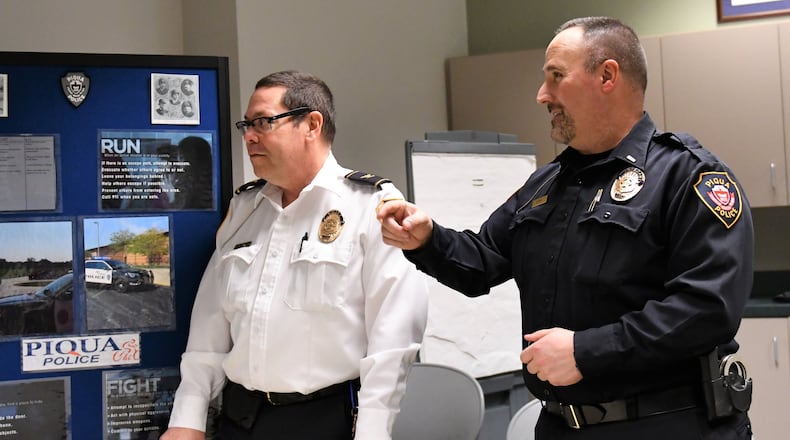“I had an interest in law enforcement and public safety pretty much all of my life,” he said.
Growing up in Pennsylvania, Jamison’s father ran the local funeral home in a town of around 1,000 people. At the time, funeral homes also ran ambulance services. As a result, the phone for the funeral business as well as the ambulance rang into the Jamison home.
“I grew up always having to be close to the phone,” Jamison said. “There has never been a period in my life where I wasn’t on call for something.”
He was drawn to the Miami Valley by the University of Dayton, where he could study criminal justice while also participating in a “fun” music program. Jamison was in the UD band, pep band and jazz band.
An enjoyment of music has continued, Jamison said, noting during his “midlife crisis” he taught himself to play the ukulele.
Searching for a law enforcement job in the mid 1980s was not easy due to the economy. He was working as an emergency medical technician in Dayton when he met his wife, Karen, who was a paramedic.
When the Piqua Police Department called, Jamison headed to Miami County and a department that would become home.
He joined the department under Chief Donald “Tony” White and was named juvenile officer in 1986. In the days before DARE, Jamison development programs for youth and later began investigating child abuse and related crimes as well as runaways and missing adults.
“As far as regrets or unfinished business, I still haven’t found Shayene Farrell,” he said. Farrell, 18, disappeared in August 1994 when she went to pick up an iced tea at a nearby store. “I still wake up at times at night with her image in my head from working that case all the years,” Jamison said.
He later became a lieutenant and watch commander before becoming deputy chief and patrol commander.
Many changes have occurred in law enforcement, and the local community, in the past three decades. There have been advances in technology and agencies today are more transparent, Jamison said.
In the mid-1980s, police would encounter someone drunk, bring them to the station, place them in lockup and let them out when they were sober.
“We are now watching people overdose to point of death, being brought back to life with Narcan and then say, ‘We hope you live to see another day. Is there anything we can do to help?’” he said.
Seeing the impact of alcohol and drug abuse, with some families for generations, helped lead to his involvement in human services organizations. “We make Piqua better working with a lot of different agencies and getting help for a lot of things other than crime,” he said.
One thing that hasn’t changed has been the attitude of police officers, Jamison said.
“We engage with our community different than we used to. I think that is better as well.
The way cops care hasn’t changed,” he said.
After retiring in June, Jamison plans to work more with his wife who is the spiritual leader of a community, Fusion, whose work involves mentoring youth. The focus is on kids who have been in trouble in juvenile court and the LGBTQ community.
Before leaving, Jamison has been working closely with Lt. Rick Byron, who will be the new chief.
“He will take it to the next level. I am confident it is going to get better. I think every chief who has been here has made things better,” Jamison said.
Contact this contributing writer at nancykburr@aol.com
About the Author
